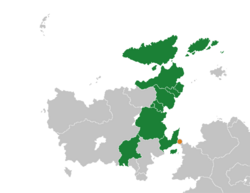Montecara–Euclean Community relations: Difference between revisions
(→Trade) |
|||
| Line 15: | Line 15: | ||
The EC is Montecara's largest trading partner by a wide margin, and [[Florena]] is its largest individual state trading partner. Montecara relies almost entirely on the EC for its supplies of such staples as food and chemicals. The EC is the destination of the vast majority of Montecara's exports, especially precision tools, luxury goods, medical instruments, and pharmaceuticals. | The EC is Montecara's largest trading partner by a wide margin, and [[Florena]] is its largest individual state trading partner. Montecara relies almost entirely on the EC for its supplies of such staples as food and chemicals. The EC is the destination of the vast majority of Montecara's exports, especially precision tools, luxury goods, medical instruments, and pharmaceuticals. | ||
EC citizens are allowed to enter Montecara without a passport; a national identity card that states citizenship is sufficient. The EC and Montecara have a mutual | EC citizens are allowed to enter Montecara without a passport; a national identity card that states citizenship is sufficient. The EC and Montecara have a mutual travel policy that allows citizens of either entity to spend up to 180 days in any 365-day period in the other visa-free for personal or business reasons. Visas are still required to work or study. | ||
== Defense == | == Defense == | ||
Revision as of 22:09, 20 January 2020
 | |
Euclean Community |
Montecara |
|---|---|
Montecara is not a member of the Euclean Community, but it does have extensive relations with both the Community and its member states.
Movement of goods and people
Montecara and the EC have been in a customs union since 1 January 2001. Goods can move between the EC and Montecara tariff-free, though they are still subject to inspection for health and safety reasons.
The EC is Montecara's largest trading partner by a wide margin, and Florena is its largest individual state trading partner. Montecara relies almost entirely on the EC for its supplies of such staples as food and chemicals. The EC is the destination of the vast majority of Montecara's exports, especially precision tools, luxury goods, medical instruments, and pharmaceuticals.
EC citizens are allowed to enter Montecara without a passport; a national identity card that states citizenship is sufficient. The EC and Montecara have a mutual travel policy that allows citizens of either entity to spend up to 180 days in any 365-day period in the other visa-free for personal or business reasons. Visas are still required to work or study.
Defense
Montecara is a member of the Euclean Common Defense Treaty Organization (ECDTO), which it joined at the organization's founding in 1948. It cooperates in ECDTO planning and exercises and allows member states' navies to make regular port calls at its harbor.
Proposed membership
| Ratification of EC Membership Agreement, 1996 | ||||||||||||||||||||||
|---|---|---|---|---|---|---|---|---|---|---|---|---|---|---|---|---|---|---|---|---|---|---|
| To ratify the agreement negotiated by the State of Montecara and the Euclean Community with the aim of securing membership in the Community | ||||||||||||||||||||||
| Date | June 28, 1996 | |||||||||||||||||||||
| ||||||||||||||||||||||
Montecara's last serious attempt to join the EC was made in 1996, when the Colegio and Senate both approved the necessary treaties of accession. When they came to a vote by the Popular Assembly, however, they were defeated by a margin of over 60%.
In the lead-up to the Popular Assembly vote, major trade unions came out strongly against the proposal, arguing that membership in the Community would undermine worker protections and allow an influx of cheap foreign labor into the country. Small entrepreneurs and craftsmen also feared increased competition from abroad, and renters reported concerns about increased housing costs and fewer available units in consequence of mass migration.
The financial sector, on the other hand, was strongly pro-membership, and executives of several prominent banking institutions made public statements to the effect that Montecara would stand to gain far more than it would lose by having essentially unrestricted access to a vast capital market. Many political liberals also supported membership on the basis of heightened international cooperation and the progress of the pan-Euclean project. Students and young people also generally supported membership for several reasons, including the increased ability to live, work, and study abroad.